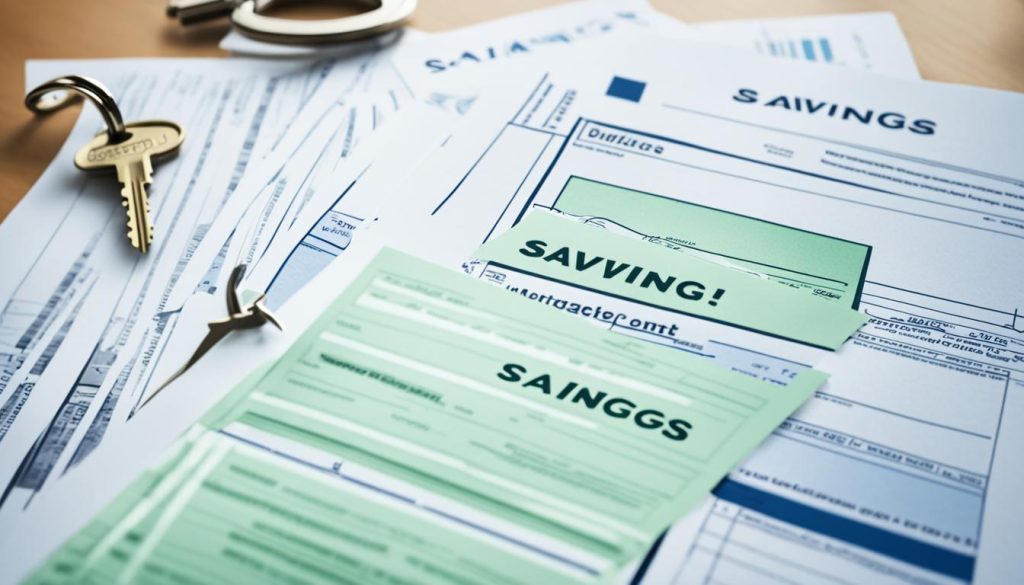If you own a home in the U.S., you can save money on taxes with mortgage deductions. The mortgage interest deduction lets you lower your taxable income by the interest you pay on your home. This can lead to big tax savings, especially if your mortgage payments are high. Plus, you might be able to deduct property taxes, cutting your taxes even more.
But, it’s key to know the IRS rules to get the most from these deductions. IRS rules can be tricky, but with the right info, you can use deductions well and lower your taxes.
Key Takeaways
- The mortgage interest deduction allows you to reduce your taxable income by the amount of interest paid on a mortgage.
- Homeowners may also be able to deduct property taxes paid on their home, further reducing their tax liability.
- Understanding the IRS rules and limitations is crucial to maximizing the tax benefits of homeownership.
- Careful record-keeping and documentation are essential for claiming eligible deductions.
- Consulting a tax professional can help you navigate the complexities of mortgage-related tax deductions.
What is the Mortgage Interest Deduction?
The mortgage interest deduction is a tax benefit that helps homeowners lower their taxable income. They can deduct the interest paid on their mortgage for their main or second home1. The loan must be secured by the home, and the home must be a qualified residence1.
A qualified home includes a house, condo, mobile home, or even a boat with basic living facilities1.
Definition and Eligibility Criteria
This deduction lets homeowners reduce their taxable income by the mortgage interest they paid1. They can deduct interest on up to $750,000 of mortgage debt for their main or second home1. If filing separately, the limit is $375,0001. Homes bought before December 16, 2017, can deduct interest on up to $1 million of mortgage debt ($500,000 for those filing separately)2.
Types of Mortgages that Qualify
Qualifying mortgages include those for main homes, second homes, and home equity loans1. Deductible items also include points, late fees, and prepayment penalties1. But, homeowners insurance, principal payments, and title insurance are not deductible1. You need a Form 1098 from your lender to claim mortgage interest on your taxes1.
To claim the deduction, itemize on Schedule A of Form 10401. Keeping detailed records is key for extra deductions, like home office expenses or rental properties1. For more info, check IRS Publication 9361.
“The mortgage interest deduction can be a significant tax break for homeowners, but it’s important to understand the eligibility criteria and limitations to maximize your savings.”
Deducting Points and Closing Costs
Homeowners can deduct some costs related to their home loans, besides mortgage interest. This includes mortgage points, which are paid upfront to get a lower interest rate3. You can deduct points paid for getting a mortgage or refinancing for home improvements on your main home3. These points are usually deducted in the year paid, if you use the cash method3. They must be a percentage of the mortgage principal and shown on the settlement statement.
Understanding Mortgage Points
3 Some costs to get a mortgage aren’t deductible, like preparing the mortgage note, appraisal fees, notary fees, and extra points from the lender3. The seller can’t deduct points for the buyer’s loan. But, these points are a selling expense that lowers the seller’s profit from the sale.
Deductible Closing Costs and Fees
Some closing costs and fees for getting a mortgage can also be deducted. This includes loan origination fees, appraisal fees, and title search fees. But, the rules for deducting these costs are complex. Homeowners should talk to a tax expert to make sure they’re saving as much as they can.
| Deductible Closing Costs | Non-Deductible Closing Costs |
|---|---|
| Loan origination fees | Appraisal fees |
| Appraisal fees | Notary fees |
| Title search fees | Mortgage note preparation |

“Consulting a tax professional is essential to ensure you’re maximizing your potential savings on mortgage-related deductions.”
mortgage interest deduction, property tax deduction, IRS rules
As a homeowner, you can enjoy tax deductions like the mortgage interest and property tax deductions4. Knowing the IRS rules and who can get these deductions can help you save more on taxes5.
The mortgage interest deduction lets you deduct the interest on up to $750,000 ($375,000 if filing separately) of mortgage debt for your main home and a second home4. If you got your mortgage before December 16, 2017, the limit is $1 million ($500,000 if filing separately)6. You might also deduct the points you paid on your mortgage if you meet certain conditions4.
The property tax deduction helps you deduct the taxes on your main home and second home, up to $10,000 ($5,000 if filing separately)6. But, there are IRS rules and limits you need to know to claim the most you can5.
Remember, the mortgage interest and property tax deductions have rules and limits465. Knowing these can help you make smart choices to get the most from your tax deductions and home ownership benefits46.

“Maximizing your tax deductions as a homeowner can make a significant difference in your overall financial well-being.”
Special Circumstances and Exceptions
The mortgage interest and property tax deductions can save you a lot of money. But, there are special situations and exceptions that might affect your eligibility7. It’s key to know these to get the most savings.
Home Equity Loans and Lines of Credit
You can deduct the interest on home equity loans and lines of credit. But, you can only do this if you used the money for buying, building, or improving your main or second home8. Remember, the interest is limited by the same rules as mortgage interest. So, keep an eye on how you use the funds.
Rental Properties and Second Homes
If you use your second home for personal use over 14 days or 10% of the rental days, you can deduct mortgage interest and property taxes7. But, the rules for rental properties are complex. It’s wise to check with a tax expert about your specific case.
There are many other exceptions and adjustments that can change your eligibility for mortgage deductions7. These include situations for separated or divorced people, surviving spouses, certain military personnel, and properties used for business or rent7. Make sure to review your situation and talk to a tax pro to claim all your eligible deductions and follow IRS rules.
“Navigating the complex world of mortgage tax deductions can be daunting, but understanding the special circumstances and exceptions can help you maximize your savings and ensure compliance with IRS rules.”7
Limitations and Restrictions
The mortgage interest and property tax deductions can save homeowners a lot on taxes. But, it’s key to know the IRS rules9. You can deduct up to $10,000 for state and local taxes combined, or $5,000 if you’re filing separately9. Make sure to watch your mortgage debt, income, and other factors to claim the most you can while following IRS rules.
Mortgage Debt Limits
The limit for deducting mortgage interest is on the first $750,000 of your mortgage debt, or $375,000 if you’re filing separately10. You can deduct the interest on up to $750,000 ($375,000 for separate filing) of your mortgage debt10.
Income Thresholds and Phase-outs
Also, the mortgage and property tax deductions can decrease as your income goes up10. Households with high incomes get most of the mortgage and property tax deductions10. A tax expert can help you figure out which deduction is best for you and how to save more on taxes while following IRS rules10.
“The mortgage interest deduction applies to second homes and vacation homes, allowing the deduction of up to $2 million yearly from state taxable income.”10
The mortgage interest and property tax deductions have limits and rules from the IRS. Homeowners need to understand these to get the most deductions without breaking the law910.
Conclusion
If you own a home in the U.S., you can save a lot on your taxes. You can get big savings by knowing about mortgage interest and property tax deductions. These IRS rules help you save more from owning a home11.
Claiming mortgage interest, deducting energy-efficient upgrades, or using the Homeowner Assistance Fund can help. It’s important to keep up with new rules and changes. Talk to tax experts and watch for updates to the tax code to make sure you get all the deductions you can11.
Using mortgage deductions can lower your taxes and help you save more for your home and family. The secret is to stay updated, keep track of your expenses, and work with tax pros. This way, you can get all the deductions you should12.
FAQ
What is the mortgage interest deduction?
Homeowners can lower their taxable income by the interest paid on their mortgage. This is for their main home or a second home.
What types of mortgages qualify for the deduction?
The mortgage must be secured by the home. It must also be for a qualified home. This includes houses, condos, co-ops, mobile homes, house trailers, boats, or similar properties with living facilities.
Can homeowners deduct mortgage points and closing costs?
Yes, homeowners can deduct mortgage points. These are prepaid interest for a lower rate. Some closing costs and fees, like loan origination fees and appraisal fees, can also be deducted.
What are the limits and restrictions for the mortgage interest deduction and property tax deduction?
The mortgage interest deduction has limits. It’s for up to 0,000 (5,000 for those filing separately) of mortgage debt for one home. Property tax deductions are up to ,000 (,000 for those filing separately). These deductions can be reduced based on your income.
Are there any special circumstances or exceptions to the deduction rules?
Yes, some exceptions exist. For example, interest on home equity loans is deductible if used for home improvements. Deductions for rental properties and second homes also have specific rules.
How can homeowners maximize their tax savings from mortgage-related deductions?
Homeowners should review their situation closely. They should keep up with IRS rules and talk to tax experts. This helps ensure they claim all eligible deductions correctly.
Source Links
- Mortgage Interest Deduction: Limit, How It Works – NerdWallet
- Mortgage Interest Deduction: How It Works | Bankrate
- Topic no. 504, Home mortgage points
- Publication 936 (2023), Home Mortgage Interest Deduction
- 2023 Publication 936
- Real estate (taxes, mortgage interest, points, other property expenses)
- Publication 523 (2023), Selling Your Home
- Topic no. 505, Interest expense
- Topic no. 503, Deductible taxes
- Mortgage Interest Deduction
- 2023 Publication 530
- Mortgage Interest Tax Deduction: What You Need to Know

